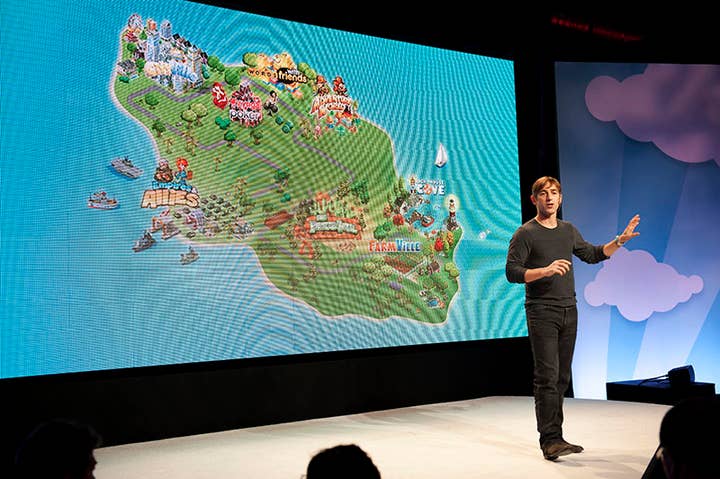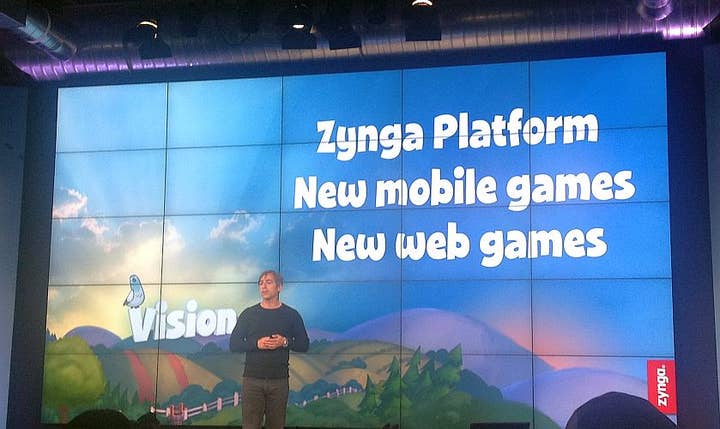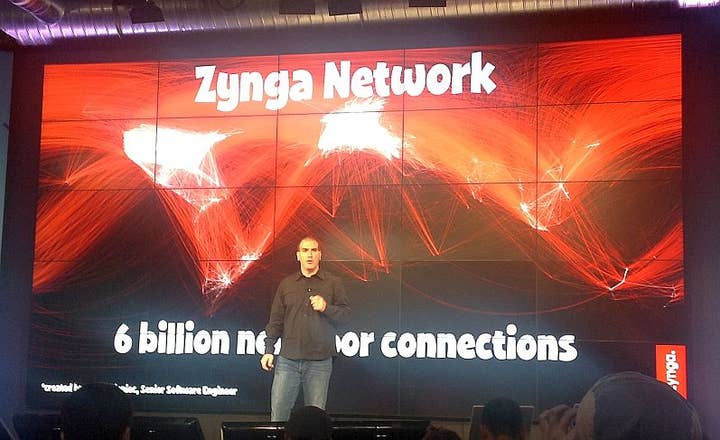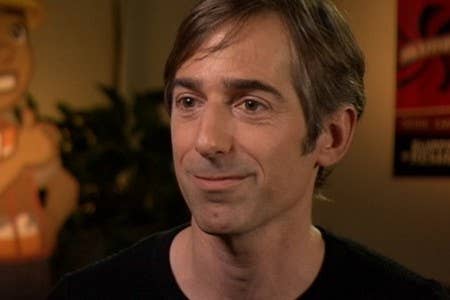Zynga Interview: Mark Pincus Part 2
Zynga's CEO talks about game advertising and why managing Zynga is like playing a game
Part two of our interview with the Chairman and CEO of Zynga, Mark Pincus, delved into the nature of social games, advertising, and the next great innovations. After interviewing many CEOs in the game industry, most are either a very business-focused person or a gamer at heart who also manages a business. Pincus is clearly a gamer at heart, even though he has his MBA from Harvard.
Disclosure: Pincus refers to Bing Gordon here, who is a partner at venture capital firm Kleiner Perkins and a Zynga board member. Bing is also the guy I used to work for at Electronic Arts back in the '80s. I let Mark Pincus know that at the beginning of the interview.
Before proceeding, please first read Part One here.
I'm in a competition now with Reid Hoffman in Scramble With Friends. It's not fun with Bing because he's off the charts in that game. You have to be well-matched in a skill-based game. What we learned with collaborative games like FarmVille that are a little more like Settlers of Catan, which has been such a great social game, is they really hide the PvP, and they have such a brilliant balance of luck and complexity. There's a complex social dynamic that keeps everyone in the game and you're able to bring new people in because - I just brought a friend into the game, and he didn't want to play, I think he ended up winning. It was basically because everyone would trade with him because nobody believed he had a chance of winning. It's almost like this self-regulating game that creates its own balance of power, and everyone thought I'd be the best so no one would trade with me, and I came in last.
I think that there's this balance that keeps the games fun and interesting. In skill and PvP you've gotta get the balance and the matching right. But we're interested in how we've been able to turn on games that are hobbies for people, and they're this escape but also have a little bit of click zen and a feeling of progressions without necessarily having to beat other people. People will still compete on levels, they make up their own ways, but they get to choose where and when they want it to be competitive versus collaborative.
Yes! I've always said that a great social game is Shakespearean, because three different people can play and have totally different experiences, different paths, and get different things out of the same game. My nephews can play and it's just a fighting game, my mom or niece can play and it's a decorating game, and I can play and it's a strategy game. I think there's that potential - not always, because games can get diluted, but I think CityVille was a little bit like that.
My nephews were all about competing to have the most ubered up franchise, and they got mad at me when the franchise system didn't go deep enough, because they're real gamers. My mom just loved decorating and designing her city, and my nephews and my mom loved that they could actually share a game. What people forget - and I felt this growing up because I was a video gamer - you feel a little bit like this misunderstood minority. No one gets it and they think what you're doing is dorky, and you're like "No, no if you would just do this, it's so cool, you'd get into this!"
"A great social game is Shakespearean"
Mark Pincus
Right! With the Nintendo Wii, it was the first time I saw my family pick up video games and start playing; they were like "Wow, this is cool, I can do bowling and tennis!" and I'm like "I've been telling you this for years!" Even for someone who's a fairly core gamer I think that there's new fun when you can see that your real friends and family will participate in a game, and you'll even step backwards, maybe, and play a game you wouldn't have played, just because you finally got them in a game.
I think there's a lot of things we need for this industry to grow. I think we need reliable, persistent navigation that is totally controlled by users, like we have on mobile. I think we need valuable communications channels. I think we need rules for developers that are transparent and don't ever change, or if they do change it's for reasons that developers agree with and understand to help grow the market of social gaming. Zynga is a participant in that ecosystem.
I believe that, not just in gaming, but in consumer internet and consumer mobile, any large consumer service application has an opportunity to open up APIs and enable other third-parties to innovate on top of their audience and their infrastructure, and that's the path we're moving down. In order to bring those developers, and have the really good ones invest in your platform over time, you need to earn and maintain their trust by being open and transparent and consistent and reliable and they need to feel like it's a dial tone; it's something like a utility that won't ever change, or if it does it's because you believe you just made it a better dial tone.

Yeah, we can see examples like AWS that have just done it beautifully from a developer standpoint. They've become part of the tech stack of the Internet. They are providing a really incredible valuable service that's giving leverage to thousands of developers, and we hope to provide a piece of that tech stack as well, and do it in a way that developers and companies feel like they can form ten-year relationships with us, that they can invest in this, see where it's going, and see what we're building together. We've always been a company that's about partnering. As a developer, we've tried to be the best, most valuable partner to Facebook, to Apple, to Google, to the Android carriers, and we hope to be the most valuable, reliable partner for any other developers if they publish with us, if they use API'ed services from us.
Look, I'm in this for the rest of my career. The same way you have been, and Bing has been, except I'm in social gaming instead of traditional gaming, and it's only been five years, but I want to build something, and I want to build these relationships with players, with developers, something that stands the test of time and is really important and valuable. I'm inspired by the way that Jeff Bezos has made that kind of reliable, consistent investment with Amazon, you feel it. There's just something that's so rock-solid about Amazon, from 360 degrees it's rock-solid. It's become a permanent part of the landscape. I would bet it's going to be there in ten years.
Whether it's AWS, or it's Amazon.com as our bookstore and our e-commerce place. You feel it's as permanent as Wal-Mart; in some ways maybe more permanent. That's what we want to be. That's what I want for social gaming, and I want for Zynga. If you look at the whole evolution and history of our company it's been about driving for long-term sustainability and scalability.
"It's OK to be a little misunderstood; but what's not OK is to change your strategy or your execution because you're worried about what your industry or investors are going to think of you in the short term"
Mark Pincus
I never really questioned whether we would go public, I just questioned when. I think that if you want to be a large, important company with a lot of employee shareholders and a diverse investor base, it's just inevitable you're going to be public. You do all you can to keep pointing toward your North Star - for us it's social - and you keep trying to point to the macro opportunities. You try to say to investors, "Decide if you believe in that long-term opportunity and then decide if you think that our strategy and our execution against that is good or bad." I think that's all we can hope for.
I think companies in new industries can be misunderstood for long periods of time. It's OK to be a little misunderstood; but what's not OK is to change your strategy or your execution because you're worried about what your industry or investors are going to think of you in the short term. I'm always inspired by how smart investors really are. When I talk to investors, the questions I get are whether we're investing enough in platform, whether we're investing enough in mobile, in advertising, and in these growth areas, not "are we optimizing the current opportunity fully." I'm a believer that the market rewards smart long-term investors, and the smart ones find their ways to the best opportunities. We hope that we attract those smart investors that see what we see.
Yeah, and when we get a daily report card, at least on our daily active users, and it's a public report card, it's a new thing. It's not just being public; we've had this long before we went public. It potentially can be a constant distraction but the flip side of it is when you launch great new games and great new mechanics, and you move those numbers in big step-function ways like we have, that's also exciting.

That's right, it turns your day job into a video game. It has immediate - not always gratification, but immediate results of your decisions, and you're on a long-term arc. That's probably why I'm so addicted and obsessed with Zynga, because it meets all my criteria for a great game.
I don't have one answer for you; I think there's multiple answers to this. I think we'll see a couple of trends continuing to play out in the next five years in social game advertising, which I think will be its own real business segment if it isn't already. One is the growth of the commodity ad business, getting more and more valuable, the display ads that are pay-per-click, I think just the sheer volume will continue to make that interesting, and I think game developers will always be some of the biggest buyers of those ads.
The second is higher value ads for brand advertisers, what we think of as engagement advertising. We think that has enormous potential to deliver great value to brands in ways that they haven't been able to unlock online before. The opportunity to let a brand like McDonald's or Best Buy or American Express start to integrate with your games and integrate with the game experience and sponsor part of the game experience, and even gamify parts of that experience, in ways that are repeatable and scalable, where you now have currencies and you can play with those currencies.
An example is putting a McDonald's in your city; it has greater payout than a regular burger joint, it has cooler looking art, and we can even give it more dimensions than that. It could connect you to everyone else who has a McDonald's in the game. It could become a social object. There are so many things that you could put in there that are scalable and repeatable but give the brand advertiser a way to drive measurable engagement. Not just engagement with their brand, but something that's actually measurable in a more meaningful way than just clicks, than just did I buy a search word and people clicked on 'burger joint' and McDonald's, what does it mean? They could actually get you to respond in more meaningful ways to their brand.
The third way that I'm really excited about is actually gamification of the ads themselves. I think, especially on mobile, the opportunity to make the ads fun and interactive and the chance to win things - it's just cool. From an end-user's standpoint, the same way that Google made ads interesting, I think we can do that by gamifying ads. Think about what you could do in Draw Something; imagine a Pepsi Challenge in the entire game today where everyone is drawing some Pepsi bottle, and they're going to announce winners, and we can take that Pepsi Draw Something Challenge across our whole network, not just Draw Something. So you could see a little Draw Something screen, and 'Take the Pepsi Challenge today' and draw a little bottle and it's like a scratch-off, you can immediately win something and enter this bigger contest. Or imagine Scramble as an ad; a Scramble ad interstitial anywhere on mobile, sponsored by AmEx or somebody, and they say 'Find these words.' I'm more intrigued by all of the low-hanging fruit that hasn't happened yet than what has happened.
"I'm really excited about gamification of the ads themselves"
Mark Pincus
The level of engagement is off the charts! Imagine the percent of people that will participate in an ad that's a game, when they're there to play games, versus an ad that is a click-through to whatever.
Yeah, I think what you're hitting on is what I'm excited about, these emergent ideas in uber-casual gaming, and the opportunity to let my mom play in a biz sim. The opportunity for my nephews or my mom to literally be running a virtual business - or a real business. My nephews told me if they could earn three dollars by playing a game, they would play it non-stop for two weeks. And they said, "Don't send me a check, send me an envelope with three cash dollars in the envelope." They were like, "That's the coolest thing we can imagine."

Right! They're already grinding away for nothing, so to actually get something out of it... It's like when my wife had her first blog, and she was so focused on having to publish every Sunday night, and finally I said "I'm just curious, what do you make on your blog?" and she said, "I get a check every month from Google for like three dollars."
It was like a virtual game, it was like a biz sim. She went on to build One Kings Lane, which is making a lot more than three dollars, I should say.
"The next great startup is going to be because they invented a new reason for 4 percent of players to want to spend money"
Mark Pincus
Yes, and that's also why competition, and many more smart companies innovating against this is just so crucial to the growth of our industry. I really believe that the next great startup is going to be defined more because they invented a new reason for 4 percent of players to want to spend money in your game - and some of them to want to spend a hundred or two hundred dollars - than because they iterated on the bubble mechanic. We're working at that all the time. I feel like we've just scratched the surface.
I always like this focus group of one, and I use myself and I use other people who are life-long never-play gamers, non-gamers, and Michael Arrington from TechCrunch was a great one for me, because he was kind of skeptical of the industry for a while. Then CityVille brought him in, and he got it. Then in Empires & Allies he was really into it, and he told me he spent $550 on the game and he really got it. When you think about that - taking somebody who was skeptical about games in their life and all of a sudden they're in this place where they're spending not $2, but $550 dollars - that, to me, shows the power. Because there were some game mechanics, both social and game, that converted him, that hit a vein.
As an industry, as we get better at honing in on what those veins are that scratches his itch, I believe that behind him there's just millions of other people who could just as easily be playing Words With Friends for free as spending real money on things that they see value in an Empires & Allies game. That's why even though I know the future's uncertain - it always is - I'm optimistic about it, because we've connected the dots before.
Or our Poker game; our very first game is still the largest game on Facebook by DAUs. I think it's been frustrating for industry analysts and investors all along that there's levels of uncertainty in the market, but I feel like my job has been to continue to go after it in a big way despite the uncertainty and to be right - more often than I'm wrong!
Every chapter in the last five years, lots of people have pointed out all of the uncertainty and all the reasons why it might not work. But I always like to challenge my teams to say, "What would it look like if everything went right?" Because we all spend so much time thinking about what wrong might look like, and we don't spend an equal amount of time or greater thinking about what right looks like.
Right! It really is true that most of us under-invest in the strategy around "what if everything goes right?" It's a constant mental battle to do it for all of us. You see all kinds of negative signals in the economy and everywhere around us that could lead you always to that place, but that's why I've always thought that the optimists are usually the most successful people, because someone's got to bet on the future.
The future's always uncertain, but you can pretty much know that something bigger is going to happen. Especially when these markets develop. I think we've proven that people want to play. I don't think we have to question anymore whether or not Michael Arrington, if there's a game for him, or my mom. That's why I'm optimistic, because I just think, OK, it's not easy to figure what the next game is that brings him in, but I know it's possible.
"I always like to challenge my teams to say, 'What would it look like if everything went right?'"
Mark Pincus
Yeah, and isn't that amazing? You guys, as the pioneers of this, might have always thought that was possible, but we're actually living that today. It must be amazing for you and Bing to see this as mainstream as TV now.
I'll remind you, my last parting comment, that people were frustrated about the web too. They were frustrated at how bad the experience was compared to AOL and the desktop. But it lowered the barriers so everybody could do it, and it got better. It kept getting better. Today it's maybe still not quite as good as a desktop but it's so good and interactive that no one complains anymore.
Right!

